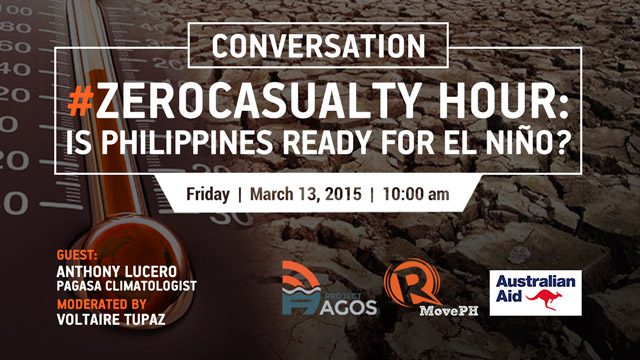SUMMARY
This is AI generated summarization, which may have errors. For context, always refer to the full article.

MANILA, Philippines – The state weather bureau PAGASA announced the onset of the El Niño in the country on Wednesday, March 11. It warned of an ‘erratic’ typhoon season.
El Niño is a weather phenomenon characterized by an unusual increase in ocean surface temperatures or warming in the center and eastern equatorial Pacific Ocean.
Occurring every two to 7 years, it can bring either heavy rain or drought that may last for a year. The last El Niño occurred between June 2009 and May 2010.
This episode of El Niño is expected to be weaker compared to the El Niño in 1997, known as the worst occurrence in the 20th century. However, it might still have significant effects because of the increased size of the population, according to some experts.
What are these effects? Who are the most vulnerable? Is the country prepared? What should be done?
On Friday, March 13 at 10:00 am, MovePH, Rappler’s civic engagement arm, will be holding a Facebook conversation on the El Niño phenomenon.
The online conversation, to be moderated by MovePH’s Voltaire Tupaz, includes climatologist Anthony Lucero, officer-in-charge of PAGASA’s Climate Monitoring and Prediction Section.
How about you, your community, and local government unit? How are you preparing for El Niño? What questions do you have?
Join the discussion which will happen on the MovePH Facebook page. – Rappler.com
This conversation initiates #ZeroCasualty hour, a series of social media conversations on disaster preparedness and climate change adaptation that Rappler will be holding with key Project Agos partners and stakeholders.
Project Agos is a collaborative platform that combines top-down government action with bottom-up civic engagement to help communities learn about climate change adaptation and disaster risk reduction. The project harnesses technology and social media to ensure critical information flows to those who need it before, during, and after a disaster. It is a partnership between Rappler and key government, private and civil society groups. It is also supported by the Australian Government.
Add a comment
How does this make you feel?
There are no comments yet. Add your comment to start the conversation.